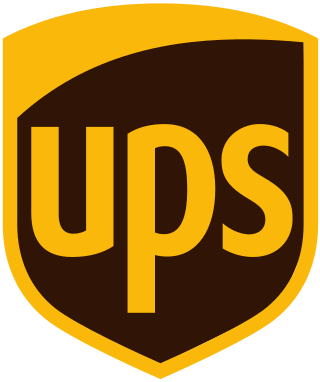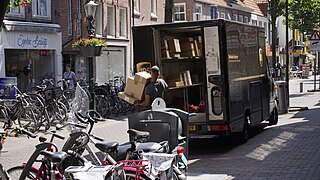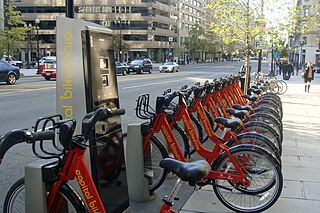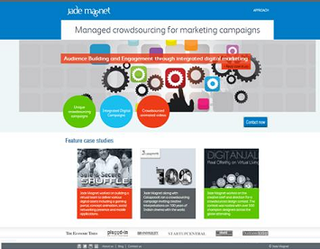Related Research Articles

The United States Postal Service (USPS), also known as the Post Office, U.S. Mail, or Postal Service, is an independent agency of the executive branch of the United States federal government responsible for providing postal service in the U.S., including its insular areas and associated states. It is one of the few government agencies explicitly authorized by the Constitution of the United States. The USPS, as of 2021, has 516,636 career employees and 136,531 non-career employees.

FedEx Corporation, formerly Federal Express Corporation and later FDX Corporation, is an American multinational conglomerate holding company focused on transportation, e-commerce and business services based in Memphis, Tennessee. The name "FedEx" is a syllabic abbreviation of the name of the company's original air division, Federal Express, which was used from 1973 until 2000. FedEx today is best known for its air delivery service, FedEx Express, which was one of the first major shipping companies to offer overnight delivery as a flagship service. Since then, FedEx also started FedEx Ground, FedEx Office, FedEx Supply Chain, FedEx Freight, and various other services across multiple subsidiaries, often meant to respond to its main competitor, UPS. The company is the fifth largest American-headquartered employer globally with 547,000 employees, and FedEx is also one of the top contractors of the US government and assists in the transport of some United States Postal Service packages through their Air Cargo Network contract.

United Parcel Service is an American multinational shipping & receiving and supply chain management company founded in 1907. Originally known as the American Messenger Company specializing in telegraphs, UPS has grown to become a Fortune 500 company and one of the world's largest shipping couriers. UPS today is primarily known for its ground shipping services as well as the UPS Store, a retail chain which assists UPS shipments and provides tools for small businesses. UPS offers air shipping on an overnight or two-day basis and delivers to post office boxes through UPS Mail Innovations and UPS SurePost, two services that pass on packages to the United States Postal Service for last-mile delivery.

Package delivery or parcel delivery is the delivery of shipping containers, parcels, or high value mail as single shipments. The service is provided by most postal systems, express mail, private courier companies, and less than truckload shipping carriers.

Freight consists of goods conveyed by water, air, or land, while cargo refers specifically to freight when conveyed via water or air. In economics, freight refers to goods transported at a freight rate for commercial gain. The term cargo is also used in case of goods in the cold-chain, because the perishable inventory is always in transit towards a final end-use, even when it is held in cold storage or other similar climate-controlled facilities, including warehouses.

Delivery is the process of transporting goods from a source location to a predefined destination. Cargo is primarily delivered via roads and railroads on land, shipping lanes on the sea, and airline networks in the air. Certain types of goods may be delivered via specialized networks, such as pipelines for liquid goods, power grids for electrical power and computer networks such as the Internet or broadcast networks for electronic information. Car transport is a particular subgroup; a related variant is Autorack, which involves the transport of autos by railroads.
A freight rate is a price at which a certain cargo is delivered from one point to another. The price depends on the form of the cargo, the mode of transport, the weight of the cargo, and the distance to the delivery destination. Many shipping services, especially air carriers, use dimensional weight for calculating the price, which takes into account both weight and volume of the cargo.

Freight companies are companies that specialize in the moving of freight, or cargo, from one place to another. These companies are divided into several variant sections. For example, international freight forwarders ship goods internationally from country to country, and domestic freight forwarders, ship goods within a single country.

Crowdsourcing involves a large group of dispersed participants contributing or producing goods or services—including ideas, votes, micro-tasks, and finances—for payment or as volunteers. Contemporary crowdsourcing often involves digital platforms to attract and divide work between participants to achieve a cumulative result. Crowdsourcing is not limited to online activity, however, and there are various historical examples of crowdsourcing. The word crowdsourcing is a portmanteau of "crowd" and "outsourcing". In contrast to outsourcing, crowdsourcing usually involves less specific and more public groups of participants.

In supply chain management and transportation planning, the last mile or last kilometer is the last leg of a journey comprising the movement of passengers and goods from a transportation hub to a final destination. The concept of "last mile" was adopted from the telecommunications industry, which faced difficulty connecting individual homes to the main telecommunications network. Similarly, in supply chain management, last-mile describes the logistical challenges at the last phase of transportation getting people and packages from hubs to their final destinations.
Third-party logistics is an organization's long term commitment of outsourcing its distribution services to third-party logistics businesses.

Jade Magnet was an online Crowdsourcing platform for creative and marketing support services. It was founded in 2009 by Sitashwa Srivastava and Manik Kinra. The company is headquartered in Bangalore, India and has white label partnerships in Qatar as Mixilion and in Singapore as id8on.
Crowdsourcing software development or software crowdsourcing is an emerging area of software engineering. It is an open call for participation in any task of software development, including documentation, design, coding and testing. These tasks are normally conducted by either members of a software enterprise or people contracted by the enterprise. But in software crowdsourcing, all the tasks can be assigned to or are addressed by members of the general public. Individuals and teams may also participate in crowdsourcing contests.
Government crowdsourcing is a form of crowdsourcing employed by governments to better leverage their constituents' collective knowledge and experience. It has tended to take the form of public feedback, project development, or petitions in the past, but has grown to include public drafting of bills and constitutions, among other things. This form of public involvement in the governing process differs from older systems of popular action, from town halls to referendums, in that it is primarily conducted online or through a similar IT medium.
LaserShip is a regional last-mile delivery company that services the Eastern and Midwest United States. Founded in 1986, LaserShip is based in Vienna, Virginia and has sorting centers in New Jersey, Ohio, North Carolina, and Florida.

LSO, originally known as Lone Star Overnight, was an Austin, Texas-based regional shipping carrier that focuses on Express next day delivery, utilizing both air and ground transportation in Texas, southeastern New Mexico, certain metro markets in Oklahoma, Louisiana, Arkansas, Alabama & Tennessee, as well as northern Mexico.

Roadie Inc. is an American crowdsourced delivery platform for business and private same-day, urgent and scheduled delivery in the United States. The company was founded in 2014 and launched its web and mobile apps in January 2015. As of September 2021, it reported having over 200,000 drivers covering more than 20,000 zip codes.

A package redirection scam is a form of e-commerce fraud, where a malicious actor manipulates a shipping label, to trick the mail carrier into delivering the package to the wrong address. This is usually done through product returns to make the merchant believe that they mishandled the return package, and thus provide a refund without the item being returned. It can also be done by the seller, generally by creating fraudulent online stores or creating fake listings on sites such as eBay or Mercari. This makes it very hard to perform a chargeback, as the tracking shows the item has been delivered. This is also known as an FTID scam, standing for Fake Tracking ID. When this scam is successful, the tracking number will show that the package has been delivered to the correct address, when the package was instead delivered to a different address. This package is generally empty or filled with garbage. However, this scam has mostly been “patched” via new technology provided by the various couriers globally. It is estimated the scam cost retailers £18,000,000,000 in lost revenue.

Veho Technologies is an American logistics service company based in New York, U.S, providing last-mile delivery and return services. The company was founded in 2016, launching a mobile app matching gig-economy drivers with package deliveries in their local areas. The company's name "Veho" comes from Latin, meaning "to carry."
References
- ↑ Carbone, Valentina; Rouquet, Aurélien; Roussat, Christine (2017). "The Rise of Crowd Logistics: A New Way to Co-Create Logistics Value" (PDF). Journal of Business Logistics. 38 (4): 238–252. doi:10.1111/jbl.12164. S2CID 168925309.
- ↑ Mckinnon, Alan (2016). "Crowdshipping: a Communal Approach to Reducing Urban Traffic Levels?". Unpublished. doi:10.13140/rg.2.2.20271.53925.
- ↑ "Using the 'crowd' to deliver packages" (PDF), US Post Office Inspector General, p. 1, retrieved 2014-02-12
- ↑ Musafer, Shanaz (14 April 2009), "Unusual ways to make money", BBC, retrieved April 14, 2009
- ↑ "Got a spare hour? Zipments.com will pay you to move something across town.", Michigan Live, retrieved May 6, 2011
- ↑ Hockenson, Lauren (7 June 2012), "Trade Valuable Goods for Unique Travel Experiences.", Mashable, retrieved June 7, 2012
- ↑ Béchet, Gilles, "The sharing economy, a revolution on the move.", Le Soir, retrieved September 10, 2013
- ↑ Russell, Jon (12 December 2013), "Friendshippr helps you 'crowdship' products and goods via friends on Facebook.", The Next Web, retrieved 2013-12-12
- ↑ "Issue In Focus: Using the 'Crowd' to Deliver Packages".
- ↑ "Using the 'Crowd' to Deliver Packages" (PDF), Issue in Focus United States Postal Service Office of Inspector General, retrieved 2014-02-12
- 1 2 Rougès, J. F.; Montreuil, B., Crowdsourcing delivery: New interconnected business models to reinvent delivery (PDF), retrieved 2014-05-28
- ↑ Rifkin, Jeremy (2014). The Zero Marginal Cost Society: The Internet of Things, the Collaborative Commons, and the Eclipse of Capitalism. St. Martin's Press. ISBN 978-1-137-27846-3.
- ↑ "Breakthrough from Innovation to Impact, Volume 1", The Owls Foundation, retrieved Mar 19, 2017
- ↑ Carbone V.; Rouquet A.; Roussat C. (2017), "The Rise of Crowd Logistics: A New Way to Co‐Create Logistics Value." (PDF), Journal of Business Logistics, 38 (4): 238–252, doi:10.1111/jbl.12164, S2CID 168925309
- 1 2 3 4 5 Carbone, Valentina; Rouquet, Aurélien; Roussat, Christine (2017). "The Rise of Crowd Logistics: A New Way to Co-Create Logistics Value" (PDF). Journal of Business Logistics. 38 (4): 238–252. doi:10.1111/jbl.12164. S2CID 168925309.
- ↑ Abudheen, Sainul, "This Filipino startup turns your traffic stress into money", E27, retrieved May 6, 2011
- ↑ "Got a spare hour? Zipments.com will pay you to move something across town.", Michigan Live, retrieved March 20, 2019
- ↑ Smith, Jennifer, "Cargomatic Gets New Funding as Rebuilding Effort Gains Traction.", The World Street Journal, archived from the original on August 15, 2018, retrieved August 15, 2018
- ↑ Fuller, Andrea, "Travelers Profit by Skirting Customs When Using Delivery Apps.", The World Street Journal, archived from the original on October 29, 2018, retrieved October 29, 2018
- ↑ Tyrsina, Radu, "Parcl Uses Trusted Forwarders to Bring you Products that don't Ship to your Country", Technology Personalised, archived from the original on October 3, 2015, retrieved October 1, 2015
- ↑ Mаршева, Влада, "В Чехии появилась новая возможность получить посылку из зарубежного магазина", 420On, archived from the original on October 3, 2015, retrieved October 1, 2015